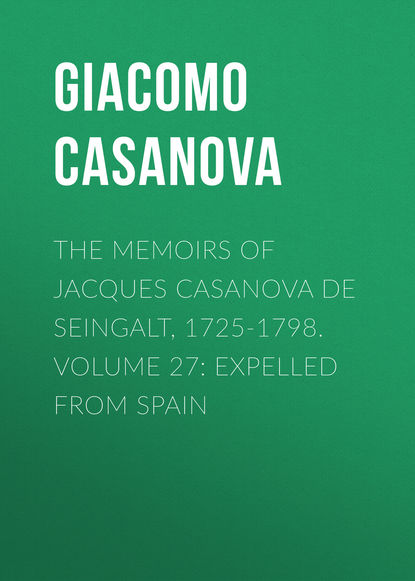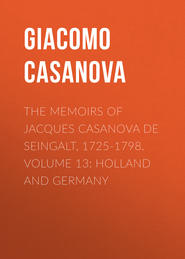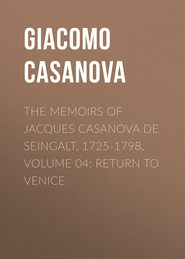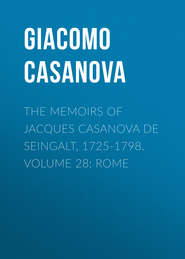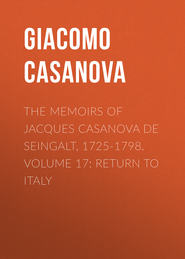По всем вопросам обращайтесь на: info@litportal.ru
(©) 2003-2025.
✖
The Memoirs of Jacques Casanova de Seingalt, 1725-1798. Volume 27: Expelled from Spain
Настройки чтения
Размер шрифта
Высота строк
Поля
The Memoirs of Jacques Casanova de Seingalt, 1725-1798. Volume 27: Expelled from Spain
Giacomo Casanova
Giacomo Casanova
The Memoirs of Jacques Casanova de Seingalt, 1725-1798. Volume 27: Expelled from Spain
CHAPTER VII
I Make a Mistake and Manucci Becomes My Mortal Foe—His Vengeance—I Leave Madrid—Saragossa—Valentia—Nina—I Arrive at Barcelona
If these Memoirs, only written to console me in the dreadful weariness which is slowly killing me in Bohemia—and which, perhaps, would kill me anywhere, since, though my body is old, my spirit and my desires are as young as ever—if these Memoirs are ever read, I repeat, they will only be read when I am gone, and all censure will be lost on me.
Nevertheless, seeing that men are divided into two sections, the one and by far the greater composed of the ignorant and superficial, and the other of the learned and reflective, I beg to state that it is to the latter I would appeal. Their judgment, I believe, will be in favour of my veracity, and, indeed, why should I not be veracious? A man can have no object in deceiving himself, and it is for myself that I chiefly write.
Hitherto I have spoken nothing but the truth, without considering whether the truth is in my favour or no. My book is not a work of dogmatic theology, but I do not think it will do harm to anyone; while I fancy that those who know how to imitate the bee and to get honey from every flower will be able to extract some good from the catalogue of my vices and virtues.
After this digression (it may be too long, but that is my business and none other's), I must confess that never have I had so unpleasant a truth to set down as that which I am going to relate. I committed a fatal act of indiscretion—an act which after all these years still gives my heart a pang as I think of it.
The day after my conquest I dined with the Venetian ambassador, and I had the pleasure of hearing that all the ministers and grandees with whom I had associated had the highest possible opinion of me. In three or four days the king, the royal family, and the ministers would return to town, and I expected to have daily conferences with the latter respecting the colony in the Sierra Morena, where I should most probably be going. Manucci, who continued to treat me as a valued friend, proposed to accompany me on my journey, and would bring with him an adventuress, who called herself Porto-Carrero, pretending to be the daughter or niece of the late cardinal of that name, and thus obtained a good deal of consideration; though in reality she was only the mistress of the French consul at Madrid, the Abbe Bigliardi.
Such was the promising state of my prospects when my evil genius brought to Madrid a native of Liege, Baron de Fraiture, chief huntsman of the principality, and a profligate, a gamester, and a cheat, like all those who proclaim their belief in his honesty nowadays.
I had unfortunately met him at Spa, and told him I was was going to Portugal. He had come after me, hoping to use me as a means of getting into good society, and of filling his pocket with the money of the dupes he aspired to make.
Gamesters have never had any proof of my belonging to their infernal clique, but they have always persisted in believing that I too am a "Greek."
As soon as this baron heard that I was in Madrid he called on me, and by dint of politeness obliged me to receive him. I thought any small civilities I might shew or introductions I might give could do me no harm. He had a travelling companion to whom he introduced me. He was a fat, ignorant fellow, but a Frenchman, and therefore agreeable. A Frenchman who knows how to present himself, who is well dressed, and has the society air, is usually accepted without demur or scrutiny. He had been a cavalry captain, but had been fortunate enough to obtain an everlasting furlough.
Four or five days after his appearance the baron asked me quietly enough to lend him a score of louis, as he was hard up. I replied as quietly, thanking him for treating me as a friend, but informing him that I really could not lend him the money, as I wanted what little I had for my own necessities.
"But we can do good business together, and you cannot possibly be moneyless."
"I do not know anything about good business, but I do know that I want my money and cannot part with it."
"We are at our wits' end to quiet our landlord; come and speak to him."
"If I were to do so I should do you more harm than good. He would ask me if I would answer for you, and I should reply that you are one of those noblemen who stand in need of no surety. All the same, the landlord would think that if I did not stand your surety, it must be from my entertaining doubts as to your solvency."
I had introduced Fraiture to Count Manucci, on the Pando, and he requested me to take him to see the count, to which request I was foolish enough to accede.
A few days later the baron opened his soul to Manucci.
He found the Venetian disposed to be obliging, but wary. He refused to lend money himself, but introduced the baron to someone who lent him money on pledges without interest.
The baron and his friend did a little gaming and won a little money, but I held aloof from them to the best of my ability.
I had my colony and Donna Ignazia, and wanted to live peacefully; and if I had spent a single night away from home, the innocent girl would have been filled with alarm.
About that time M. de Mocenigo went as ambassador to France, and was replaced by M. Querini. Querini was a man of letters, while Mocenigo only liked music and his own peculiar kind of love.
The new ambassador was distinctly favourable to me, and in a few days I had reason to believe that he would do more for me than ever Mocenigo would have done.
In the meanwhile, the baron and his friend began to think of beating a retreat to France. There was no gaming at the ambassador's and no gaming at the Court; they must return to France, but they owed money to their landlord, and they wanted money for the journey. I could give them nothing, Manucci would give them nothing; we both pitied them, but our duty to ourselves made us cruel to everyone else. However, he brought trouble on us.
One morning Manucci came to see me in evident perturbation.
"What is the matter?" said I.
"I do not know exactly. For the last week I have refused to see the Baron Fraiture, as not being able to give him money, his presence only wearied me. He has written me a letter, in which he threatens to blow out his brains to-day if I will not lend him a hundred pistoles."
"He said the same thing to me three days ago; but I replied that I would bet two hundred pistoles that he would do nothing of the kind. This made him angry, and he proposed to fight a duel with me; but I declined on the plea that as he was a desperate man either he would have an advantage over me or I, over him. Give him the same answer, or, better still, no answer at all."
"I cannot follow your advice. Here are the hundred pistoles. Take them to him and get a receipt."
I admired his generosity and agreed to carry out his commission. I called on the baron, who seemed rather uncomfortable when I walked in; but considering his position I was not at all surprised.
I informed him that I was the bearer of a thousand francs from Count Manucci, who thereby placed him in a position to arrange his affairs and to leave Madrid. He received the money without any signs of pleasure, surprise, or gratitude, and wrote out the receipt. He assured me that he and his friend would start for Barcelona and France on the following day.
I then took the document to Manucci, who was evidently suffering from some mental trouble; and I remained to dinner with the ambassador. It was for the last time.
Three days after I went to dine with the ambassadors (for they all dined together), but to my astonishment the porter told me that he had received orders not to admit me.
The effect of this sentence on me was like that of a thunderbolt; Ireturned home like a man in a dream. I immediately sat down and wrote to Manucci, asking him why I had been subjected to such an insult; but Philippe, my man, brought me back the letter unopened.
This was another surprise; I did not know what to expect next. "What can be the matter?" I said to myself. "I cannot imagine, but I will have an explanation, or perish."
I dined sadly with Donna Ignazia, without telling her the cause of my trouble, and just as I was going to take my siesta a servant of Manucci's brought me a letter from his master and fled before I could read it. The letter contained an enclosure which I read first. It was from Baron de Fraiture. He asked Manucci to lend him a hundred pistoles, promising to shew him the man whom he held for his dearest friend to be his worst enemy.
Manucci (honouring me, by the way, with the title of ungrateful traitor) said that the baron's letter had excited his curiosity and he had met him in St. Jerome's Park, where the baron had clearly proved this enemy to be myself, since I had informed the baron that though the name of Manucci was genuine the title of count was quite apocryphal.
After recapitulating the information which Fraiture had given him, and which could only have proceeded from myself, he advised me to leave Madrid as soon as possible, in a week at latest.
I can give the reader no idea of the shock this letter gave me. For the first time in my life I had to confess myself guilty of folly, ingratitude, and crime. I felt that my fault was beyond forgiveness, and did not think of asking Manucci to pardon me; I could do nothing but despair.
Nevertheless, in spite of Manucci's just indignation, I could not help seeing that he had made a great mistake in advising me, in so insulting a manner, to leave Madrid in a week. The young man might have known that my self-respect would forbid my following such a piece of advice. He could not compel me to obey his counsel or command; and to leave Madrid would have been to commit a second baseness worse than the first.
A prey to grief I spent the day without taking any steps one way or the other, and I went to bed without supping and without the company of Donna Ignazia.
After a sound sleep I got up and wrote to the friend whom I had offended a sincere and humble confession of my fault. I concluded my letter by saying that I hoped that this evidence of my sincere and heartfelt repentance would suffice, but if not that I was ready to give him any honourable satisfaction in my power.
"You may," I said, "have me assassinated if you like, but I shall not leave Madrid till its suits me to do so."
I put a commonplace seal on my letter, and had the address written by Philippe, whose hand was unknown to Manucci, and then I sent it to Pando where the king had gone.
I kept my room the whole day; and Donna Ignazia, seeing that I had recovered my spirits to some degree, made no more enquiries about the cause of my distress. I waited in the whole of the next day, expecting a reply, but in vain.
The third day, being Sunday, I went out to call on the Prince della Catolica. My carriage stopped at his door, but the porter came out and told me in a polite whisper that his highness had his reasons for not receiving me any longer.
This was an unexpected blow, but after it I was prepared for anything.
Giacomo Casanova
Giacomo Casanova
The Memoirs of Jacques Casanova de Seingalt, 1725-1798. Volume 27: Expelled from Spain
CHAPTER VII
I Make a Mistake and Manucci Becomes My Mortal Foe—His Vengeance—I Leave Madrid—Saragossa—Valentia—Nina—I Arrive at Barcelona
If these Memoirs, only written to console me in the dreadful weariness which is slowly killing me in Bohemia—and which, perhaps, would kill me anywhere, since, though my body is old, my spirit and my desires are as young as ever—if these Memoirs are ever read, I repeat, they will only be read when I am gone, and all censure will be lost on me.
Nevertheless, seeing that men are divided into two sections, the one and by far the greater composed of the ignorant and superficial, and the other of the learned and reflective, I beg to state that it is to the latter I would appeal. Their judgment, I believe, will be in favour of my veracity, and, indeed, why should I not be veracious? A man can have no object in deceiving himself, and it is for myself that I chiefly write.
Hitherto I have spoken nothing but the truth, without considering whether the truth is in my favour or no. My book is not a work of dogmatic theology, but I do not think it will do harm to anyone; while I fancy that those who know how to imitate the bee and to get honey from every flower will be able to extract some good from the catalogue of my vices and virtues.
After this digression (it may be too long, but that is my business and none other's), I must confess that never have I had so unpleasant a truth to set down as that which I am going to relate. I committed a fatal act of indiscretion—an act which after all these years still gives my heart a pang as I think of it.
The day after my conquest I dined with the Venetian ambassador, and I had the pleasure of hearing that all the ministers and grandees with whom I had associated had the highest possible opinion of me. In three or four days the king, the royal family, and the ministers would return to town, and I expected to have daily conferences with the latter respecting the colony in the Sierra Morena, where I should most probably be going. Manucci, who continued to treat me as a valued friend, proposed to accompany me on my journey, and would bring with him an adventuress, who called herself Porto-Carrero, pretending to be the daughter or niece of the late cardinal of that name, and thus obtained a good deal of consideration; though in reality she was only the mistress of the French consul at Madrid, the Abbe Bigliardi.
Such was the promising state of my prospects when my evil genius brought to Madrid a native of Liege, Baron de Fraiture, chief huntsman of the principality, and a profligate, a gamester, and a cheat, like all those who proclaim their belief in his honesty nowadays.
I had unfortunately met him at Spa, and told him I was was going to Portugal. He had come after me, hoping to use me as a means of getting into good society, and of filling his pocket with the money of the dupes he aspired to make.
Gamesters have never had any proof of my belonging to their infernal clique, but they have always persisted in believing that I too am a "Greek."
As soon as this baron heard that I was in Madrid he called on me, and by dint of politeness obliged me to receive him. I thought any small civilities I might shew or introductions I might give could do me no harm. He had a travelling companion to whom he introduced me. He was a fat, ignorant fellow, but a Frenchman, and therefore agreeable. A Frenchman who knows how to present himself, who is well dressed, and has the society air, is usually accepted without demur or scrutiny. He had been a cavalry captain, but had been fortunate enough to obtain an everlasting furlough.
Four or five days after his appearance the baron asked me quietly enough to lend him a score of louis, as he was hard up. I replied as quietly, thanking him for treating me as a friend, but informing him that I really could not lend him the money, as I wanted what little I had for my own necessities.
"But we can do good business together, and you cannot possibly be moneyless."
"I do not know anything about good business, but I do know that I want my money and cannot part with it."
"We are at our wits' end to quiet our landlord; come and speak to him."
"If I were to do so I should do you more harm than good. He would ask me if I would answer for you, and I should reply that you are one of those noblemen who stand in need of no surety. All the same, the landlord would think that if I did not stand your surety, it must be from my entertaining doubts as to your solvency."
I had introduced Fraiture to Count Manucci, on the Pando, and he requested me to take him to see the count, to which request I was foolish enough to accede.
A few days later the baron opened his soul to Manucci.
He found the Venetian disposed to be obliging, but wary. He refused to lend money himself, but introduced the baron to someone who lent him money on pledges without interest.
The baron and his friend did a little gaming and won a little money, but I held aloof from them to the best of my ability.
I had my colony and Donna Ignazia, and wanted to live peacefully; and if I had spent a single night away from home, the innocent girl would have been filled with alarm.
About that time M. de Mocenigo went as ambassador to France, and was replaced by M. Querini. Querini was a man of letters, while Mocenigo only liked music and his own peculiar kind of love.
The new ambassador was distinctly favourable to me, and in a few days I had reason to believe that he would do more for me than ever Mocenigo would have done.
In the meanwhile, the baron and his friend began to think of beating a retreat to France. There was no gaming at the ambassador's and no gaming at the Court; they must return to France, but they owed money to their landlord, and they wanted money for the journey. I could give them nothing, Manucci would give them nothing; we both pitied them, but our duty to ourselves made us cruel to everyone else. However, he brought trouble on us.
One morning Manucci came to see me in evident perturbation.
"What is the matter?" said I.
"I do not know exactly. For the last week I have refused to see the Baron Fraiture, as not being able to give him money, his presence only wearied me. He has written me a letter, in which he threatens to blow out his brains to-day if I will not lend him a hundred pistoles."
"He said the same thing to me three days ago; but I replied that I would bet two hundred pistoles that he would do nothing of the kind. This made him angry, and he proposed to fight a duel with me; but I declined on the plea that as he was a desperate man either he would have an advantage over me or I, over him. Give him the same answer, or, better still, no answer at all."
"I cannot follow your advice. Here are the hundred pistoles. Take them to him and get a receipt."
I admired his generosity and agreed to carry out his commission. I called on the baron, who seemed rather uncomfortable when I walked in; but considering his position I was not at all surprised.
I informed him that I was the bearer of a thousand francs from Count Manucci, who thereby placed him in a position to arrange his affairs and to leave Madrid. He received the money without any signs of pleasure, surprise, or gratitude, and wrote out the receipt. He assured me that he and his friend would start for Barcelona and France on the following day.
I then took the document to Manucci, who was evidently suffering from some mental trouble; and I remained to dinner with the ambassador. It was for the last time.
Three days after I went to dine with the ambassadors (for they all dined together), but to my astonishment the porter told me that he had received orders not to admit me.
The effect of this sentence on me was like that of a thunderbolt; Ireturned home like a man in a dream. I immediately sat down and wrote to Manucci, asking him why I had been subjected to such an insult; but Philippe, my man, brought me back the letter unopened.
This was another surprise; I did not know what to expect next. "What can be the matter?" I said to myself. "I cannot imagine, but I will have an explanation, or perish."
I dined sadly with Donna Ignazia, without telling her the cause of my trouble, and just as I was going to take my siesta a servant of Manucci's brought me a letter from his master and fled before I could read it. The letter contained an enclosure which I read first. It was from Baron de Fraiture. He asked Manucci to lend him a hundred pistoles, promising to shew him the man whom he held for his dearest friend to be his worst enemy.
Manucci (honouring me, by the way, with the title of ungrateful traitor) said that the baron's letter had excited his curiosity and he had met him in St. Jerome's Park, where the baron had clearly proved this enemy to be myself, since I had informed the baron that though the name of Manucci was genuine the title of count was quite apocryphal.
After recapitulating the information which Fraiture had given him, and which could only have proceeded from myself, he advised me to leave Madrid as soon as possible, in a week at latest.
I can give the reader no idea of the shock this letter gave me. For the first time in my life I had to confess myself guilty of folly, ingratitude, and crime. I felt that my fault was beyond forgiveness, and did not think of asking Manucci to pardon me; I could do nothing but despair.
Nevertheless, in spite of Manucci's just indignation, I could not help seeing that he had made a great mistake in advising me, in so insulting a manner, to leave Madrid in a week. The young man might have known that my self-respect would forbid my following such a piece of advice. He could not compel me to obey his counsel or command; and to leave Madrid would have been to commit a second baseness worse than the first.
A prey to grief I spent the day without taking any steps one way or the other, and I went to bed without supping and without the company of Donna Ignazia.
After a sound sleep I got up and wrote to the friend whom I had offended a sincere and humble confession of my fault. I concluded my letter by saying that I hoped that this evidence of my sincere and heartfelt repentance would suffice, but if not that I was ready to give him any honourable satisfaction in my power.
"You may," I said, "have me assassinated if you like, but I shall not leave Madrid till its suits me to do so."
I put a commonplace seal on my letter, and had the address written by Philippe, whose hand was unknown to Manucci, and then I sent it to Pando where the king had gone.
I kept my room the whole day; and Donna Ignazia, seeing that I had recovered my spirits to some degree, made no more enquiries about the cause of my distress. I waited in the whole of the next day, expecting a reply, but in vain.
The third day, being Sunday, I went out to call on the Prince della Catolica. My carriage stopped at his door, but the porter came out and told me in a polite whisper that his highness had his reasons for not receiving me any longer.
This was an unexpected blow, but after it I was prepared for anything.





